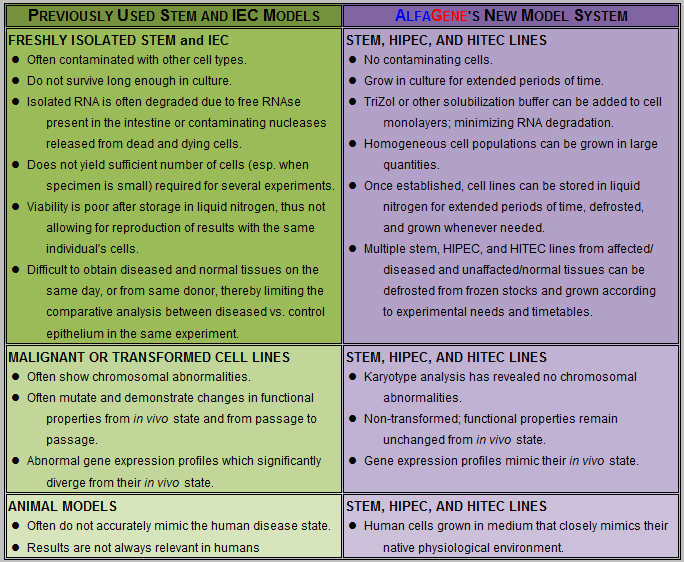The AlfaGene Advantage
AlfaGene BioScience's possesses proprietary technology and systems, not only, for the procurement, isolation, and long term culturing of human adult gastrointestinal (GI) stem cells, but also, the ability to direct these stem cells to differentiate into the epithelial cell types normally found lining the GI tract in vivo, and the ability to establish and maintain these non-transformed human intestinal primary epithelial cell (HIPEC) lines derived from these stem cell lines in culture for many passages over a long period of time.
Significant progress has been made in studies of the functional
capabilities of stem and intestinal
epithelial
cells (IEC), and of the ways in which
they may be altered in acute and chronic inflammatory or malignant
states, by using 1) malignant transformed cell lines, 2) isolated
epithelial cells, and 3) animal models. In all cases, however,
inaccuracies have arisen in extrapolating from the data obtained
utilizing these methods, since each method has inherent limitations
and differs markedly from the
in vivo state of the stem and epithelial cells being examined (see
table below). For
example, transformed malignant cell lines, by their very nature,
differ significantly in their behavior, as compared to primary cell
lines or in vivo.
Transformed cell lines usually have chromosomal abnormalities that cause instability, as
well as, abnormal growth growth characteristics and altered gene
expression patterns. Tumor cell lines also suffer variability issues
from cell line to cell line, and from passage to passage.
The use of freshly isolated epithelial or stem cells is often
complicated, not only by the concurrent isolation and contamination
with a mixture of several additional cell types including T cells, B
cells, or macrophages (especially when inflamed tissue is used as
cell source) and low yields, but also, by the fact that the
isolation procedure itself can alter the phenotype of the cells by
cleaving certain molecules from the cell surface.
Furthermore, surface and
crypt epithelial cells may have different phenotypes and functions
and are not usually fully represented in separated populations.
Also, entities, other than
AlphaGene, have been
unable to culture and expand these stem and primary cell
populations. In an
attempt to resolve some of these problems, transformed epithelial
cell lines have been established from human, mouse and rat
epithelium. Although this
model system allows the cells to retain some specific functions and
indefinite survival, there has been concern about the altered growth
control and gene expression patterns in these cells through the
transfection of viral DNA (such as the large T - antigen gene from
SV40). Similarly, findings with animal model systems show that these
models do not always precisely mimic the functional scenarios of
human intestinal epithelial cells
in vivo.

